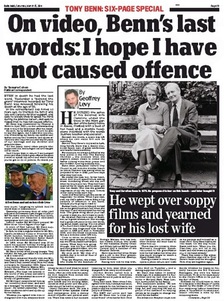Tony Benn: even-handed Mail makes rest of the Tory Press look churlishBob Crow waited two days to declare that he would not shed a single tear over the death of Margaret Thatcher and that he hoped she'd rot in hell.
Many were much quicker off the mark: Twitter and Facebook were full of joyful messages and there was real dancing in the street. When Crow died on Wednesday, even the rightwing papers that loathed him managed to find something to say that wasn't too rude. But they didn't manage to hold their noses for long. On Friday Max Hastings spluttered into print in a spasm of such outraged indignation at the 'unadulterated tosh' of the previous day that he managed to cram communist, trotskyist, marxist, blackmail, bludgeon, smash-and-grab, class war and innocent bystanders into a single sentence. |
|
|
The ink on the newsprint was barely dry before another, greater, demon from the Left made his exit. For a couple of hours on Friday morning, the political world and its onlookers said very nice things about Tony Benn, man of principle. Facebook and Twitter were alive with soundbites - "If we can find money to kill people, we can find money to help people" and other unarguable sentiments. For the young generation he was everybody's favourite leftie, a comforting grandfatherly figure with his pipe and pullovers.
But how long before the focus would shift to his privileged background as Viscount Stansgate, his country pile, his disruptive influence within the Labour party of the 1970s and the panic that surrounded his candidacy for the deputy leadership in 1981?
Well, what do you know? No sooner had SubScribe posed the question than an answer pinged back from an old friend and colleague:
"Hmmm. As a v young reporter, working a Fleet Street graveyard shift, I was sent to Benn’s house one night to check out a story. I could see him from the street, talking on the phone in his upstairs study, but he took a strangely long time to answer the door. When he did, he was barefoot, dressed in pyjamas and ranting that I’d woken him up and he was going to complain to the Press Council etc. After that, I never believed a word he said about anything."
By lunchtime, Harold Wilson's former Press Secretary Joe Haines was throwing cabbages:
"He did one great thing in his life: he changed the constitution of the House of Lords. Apart from that he symbolised the sort of left-wing nuttiness that almost destroyed the Labour party in the late 1970s and early 80s."
Denis Healey, who won that deputy leadership contest (and must often have wished he hadn't), ascribed a different legacy to his old rival - Concorde - and then promptly dismissed the most beautiful passenger aircraft the world has known as a waste of money.
The SubScribe timeline was also filling up fast:
"If it had not been for Wedgy we probably would not have entered the 'common market' - the feeling then if he was against it, as he vehemently was then the right thing to do would be to vote for in"
...and from another correspondent:
"I think we should be grateful for Britain's seemingly inherent distrust of intellectuals; Viscount Stansgate and Enoch Powell were doubtless two of the greatest intellects to grace (or besmirch) politics in my lifetime but the thought of either of them as PM fills me with horror."
Once Max Hastings had broken the taboo, it was open season on Benn. Benedict Brogan came out with guns blazing in yesterday's Telegraph, with the explanation:
"Politics, thankfully, is exempt from the rule that it is poor form to dance on the grave before there is a body in it...."
I'm not sure who established that exception, but Brogan made hay with it.
"Just as 18th century England quaked at the thought of French sans-culottes sailing the guillotine across the Channel, so for a while was Mr Benn the embodiment of an imagined socialist Terror about to descend on the Home Counties."
What?
Brogan continues:
"Unilateral disarmament, mass nationalisation, ending the monarchy, a united Ireland, his suggestions made Labour unelectable. As the Tories discovered decades later, the fratricidal wars he launched to gain control of the party added to the impression that Labour was mad, bad and dangerous to vote for."
So far, so true, but then he caps it off:
"For many, it was the image of a starey eyed Mr Benn that suggested the madness."
Matthew Parris was even more forthright in the Times:
"Bob Crow, the Luddite RMT union boss who died this week, was promptly soft-soaped with posthumous platitude, apparently he was "a fighter and a man of character"...Did Enoch Powell get this treatment from old enemies? Why do we who are not of the Left collude in rebranding hard-left bruisers and Marxist nutters as patriotic poppets?"
He goes on to take a shot at Clement Attlee, Anueurin Bevan - for daring to invent the NHS - Michael Foot and Anthony Crosland, concluding:
"Just because death or old age has drawn their teeth, why hold back from putting the boot in to these people's malignant legacy?
As the Lady sees it, the late Ian Gow once told me, 'when you're crocodile-hunting and you've got the reptile beached on a sandbank, you don't help it back into the deep. You stick the knife in.'
The prophets of 20th-century socialism are beached. Stick in the knife."
Hmmm, as my friend said.
SubScribe is not convinced. The immediate aftermath of a death is not a time to polish your own prejudices, but a time to reflect on the whole person. How a life was lived, whether the newly deceased was true to his or herself, whether they had tenets that guided them that might inform your own or others' thinking. No one is wholly bad or wholly good.
Margaret Thatcher, Bob Crow and Tony Benn had beliefs that had an impact on us all. And we all knew while they were alive whether we felt that impact was beneficial or malign. We knew about the miners' strike, the big salary and the council house, the landed gentleman who wanted to give up our nuclear deterrent and nationalise everything. Of course these should be included in any assessment of these lives.
But these are not the only signposts to the value of a life. For Max Hastings to write, as he did about Crow, that Britain will not be a worse place without him, is to disregard his worth as a father, partner, disco dancer or whatever.
Yes, the rentaquote tributes from political opponents (and even allies) are trite and empty. But it is our job as journalists to look beyond the easy and the obvious to try to offer a rounded view of a life, however wrong-headed we may believe the liver to have been.
But how long before the focus would shift to his privileged background as Viscount Stansgate, his country pile, his disruptive influence within the Labour party of the 1970s and the panic that surrounded his candidacy for the deputy leadership in 1981?
Well, what do you know? No sooner had SubScribe posed the question than an answer pinged back from an old friend and colleague:
"Hmmm. As a v young reporter, working a Fleet Street graveyard shift, I was sent to Benn’s house one night to check out a story. I could see him from the street, talking on the phone in his upstairs study, but he took a strangely long time to answer the door. When he did, he was barefoot, dressed in pyjamas and ranting that I’d woken him up and he was going to complain to the Press Council etc. After that, I never believed a word he said about anything."
By lunchtime, Harold Wilson's former Press Secretary Joe Haines was throwing cabbages:
"He did one great thing in his life: he changed the constitution of the House of Lords. Apart from that he symbolised the sort of left-wing nuttiness that almost destroyed the Labour party in the late 1970s and early 80s."
Denis Healey, who won that deputy leadership contest (and must often have wished he hadn't), ascribed a different legacy to his old rival - Concorde - and then promptly dismissed the most beautiful passenger aircraft the world has known as a waste of money.
The SubScribe timeline was also filling up fast:
"If it had not been for Wedgy we probably would not have entered the 'common market' - the feeling then if he was against it, as he vehemently was then the right thing to do would be to vote for in"
...and from another correspondent:
"I think we should be grateful for Britain's seemingly inherent distrust of intellectuals; Viscount Stansgate and Enoch Powell were doubtless two of the greatest intellects to grace (or besmirch) politics in my lifetime but the thought of either of them as PM fills me with horror."
Once Max Hastings had broken the taboo, it was open season on Benn. Benedict Brogan came out with guns blazing in yesterday's Telegraph, with the explanation:
"Politics, thankfully, is exempt from the rule that it is poor form to dance on the grave before there is a body in it...."
I'm not sure who established that exception, but Brogan made hay with it.
"Just as 18th century England quaked at the thought of French sans-culottes sailing the guillotine across the Channel, so for a while was Mr Benn the embodiment of an imagined socialist Terror about to descend on the Home Counties."
What?
Brogan continues:
"Unilateral disarmament, mass nationalisation, ending the monarchy, a united Ireland, his suggestions made Labour unelectable. As the Tories discovered decades later, the fratricidal wars he launched to gain control of the party added to the impression that Labour was mad, bad and dangerous to vote for."
So far, so true, but then he caps it off:
"For many, it was the image of a starey eyed Mr Benn that suggested the madness."
Matthew Parris was even more forthright in the Times:
"Bob Crow, the Luddite RMT union boss who died this week, was promptly soft-soaped with posthumous platitude, apparently he was "a fighter and a man of character"...Did Enoch Powell get this treatment from old enemies? Why do we who are not of the Left collude in rebranding hard-left bruisers and Marxist nutters as patriotic poppets?"
He goes on to take a shot at Clement Attlee, Anueurin Bevan - for daring to invent the NHS - Michael Foot and Anthony Crosland, concluding:
"Just because death or old age has drawn their teeth, why hold back from putting the boot in to these people's malignant legacy?
As the Lady sees it, the late Ian Gow once told me, 'when you're crocodile-hunting and you've got the reptile beached on a sandbank, you don't help it back into the deep. You stick the knife in.'
The prophets of 20th-century socialism are beached. Stick in the knife."
Hmmm, as my friend said.
SubScribe is not convinced. The immediate aftermath of a death is not a time to polish your own prejudices, but a time to reflect on the whole person. How a life was lived, whether the newly deceased was true to his or herself, whether they had tenets that guided them that might inform your own or others' thinking. No one is wholly bad or wholly good.
Margaret Thatcher, Bob Crow and Tony Benn had beliefs that had an impact on us all. And we all knew while they were alive whether we felt that impact was beneficial or malign. We knew about the miners' strike, the big salary and the council house, the landed gentleman who wanted to give up our nuclear deterrent and nationalise everything. Of course these should be included in any assessment of these lives.
But these are not the only signposts to the value of a life. For Max Hastings to write, as he did about Crow, that Britain will not be a worse place without him, is to disregard his worth as a father, partner, disco dancer or whatever.
Yes, the rentaquote tributes from political opponents (and even allies) are trite and empty. But it is our job as journalists to look beyond the easy and the obvious to try to offer a rounded view of a life, however wrong-headed we may believe the liver to have been.

That is why the Mail did its job better than any other newspaper on Benn yesterday. His death was first mention on page 19 in a story about an interview with Channel 4 recorded 12 years ago on the condition that it would not be aired while he was alive. A gentle news story, accompanied by a gentle sidebar by Geoffrey Levy about how Benn had bought the park bench on which he had proposed to his wife Caroline and how he would weep at the final scene of The Railway Children.
Few newspapers could feel greater antipathy to everything Benn stood for than the Mail, but it dealt with the human being first and then moved on to the politician with an essay by Dominic Sandbrook (he of the Seventies TV series) and a leader saying Benn had been wrong about everything.
And finally we were left to judge for ourselves (well as far as you can when spoonfed edited highlights) with three pages of extracts from the Benn diaries.
The Mail gets it so wrong so often. But it does understand that people will generally look for the good in someone, particularly if they have recently breathed their last.
It comes to something when the Mail makes Matthew Parris look churlish.
SubScribe: Bob Crow wins his final media battle
SubScribe: Speaking ill of the dead
Few newspapers could feel greater antipathy to everything Benn stood for than the Mail, but it dealt with the human being first and then moved on to the politician with an essay by Dominic Sandbrook (he of the Seventies TV series) and a leader saying Benn had been wrong about everything.
And finally we were left to judge for ourselves (well as far as you can when spoonfed edited highlights) with three pages of extracts from the Benn diaries.
The Mail gets it so wrong so often. But it does understand that people will generally look for the good in someone, particularly if they have recently breathed their last.
It comes to something when the Mail makes Matthew Parris look churlish.
SubScribe: Bob Crow wins his final media battle
SubScribe: Speaking ill of the dead




